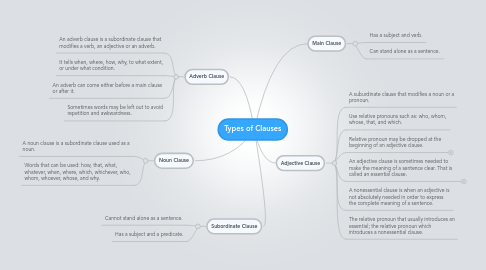Types of Clauses
af Taylor Doell


1. Subordinate Clause
1.1. Cannot stand alone as a sentence.
1.2. Has a subject and a predicate.
2. Adverb Clause
2.1. An adverb clause is a subordinate clause that modifies a verb, an adjective or an adverb.
2.2. It tells when, where, how, why, to what extent, or under what condition.
2.3. An adverb can come either before a main clause or after it.
2.4. Sometimes words may be left out to avoid repetition and awkwardness.
3. Noun Clause
3.1. A noun clause is a subordinate clause used as a noun.
3.2. Words that can be used: how, that, what, whatever, when, where, which, whichever, who, whom, whoever, whose, and why.
4. Main Clause
4.1. Has a subject and verb.
4.2. Can stand alone as a sentence.
5. Adjective Clause
5.1. A suburdinate clause that modifies a noun or a pronoun.
5.2. Use relative pronouns such as: who, whom, whose, that, and which.
5.3. Relative pronoun may be dropped at the beginning of an adjective clause.
5.3.1. An
5.4. An adjective clause is sometimes needed to make the meaning of a sentence clear. That is called an essential clause.
5.4.1. New node
